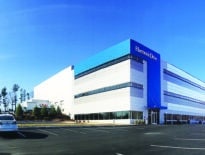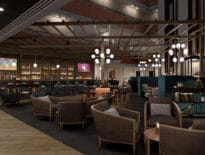
Boston is set to add more than 2,000 new hotel rooms in 2021, putting more pressure upon properties’ financial performance in a market that has been one of the nation’s hardest hit during the pandemic. The 212-room Canopy by Hilton Boston Downtown hotel is under construction on Blackstone Street. Photo by Steve Adams | Banker & Tradesman Staff
Last year turned the tourism industry upside down, and even Boston’s diverse mix of business could not stop the negative impacts of the global pandemic.
Pre-pandemic, Boston was poised for another strong year. Boston ranked fourth in overall average daily rate (ADR) in 2019 among the 65 markets tracked by CBRE Econometric Advisors, and for the first time surpassed $200 in ADR. For the first two months of 2020, revenue per available room (RevPAR) increased for the Boston market by 4.5 percent.
While the course of Boston’s hotel industry turned dramatically, Boston’s longstanding demand generators, industry growth and pent-up travel demand will help the city’s upcoming recovery efforts.
The COVID-19 pandemic affected travel unlike anything ever before. Greater Boston RevPAR fell by almost 75 percent in 2020, with second-quarter RevPAR decreasing by over 90 percent. Overall, Boston hotels lost on average over $6 million in room revenues per day last year. In comparison, RevPAR during the Great Recession in 2009 decreased by 11.2 percent; the loss in RevPAR as a result of COVID-19 was almost 10 times greater than that of 2009. In addition, RevPAR recovered to pre-recession levels in 2012, two years after the previous low, while CBRE is not forecasting full RevPAR recovery in this cycle until the end of 2023.
Spring Reopening Offers Indicators of Demand
For Boston, the start of the recovery following the pandemic is in sight. The key to a city’s early recovery was the “openness” of the city. Boston had relatively strict capacity restrictions in early 2021, and Boston’s cold weather climate did not help. With business and group travel still at a standstill, leisure demand flocked to warmer weather destinations with looser restrictions. For the first three months of the year, Boston ranked second-to-last in terms of occupancy. The city with the lowest recorded occupancy in 2020 was San Francisco, which banned non-essential travel for the vast majority of the year, leading many hotels to temporarily close their doors.
Boston removed all capacity restrictions at the end of May. The city now can start to see the early indications of a recovery, which is well-timed with the leisure travel season approaching. Leisure travel is expected to carry the industry for the near future as a result of pent-up demand in combination with summer travel.
With its waterfront location, ideal summer temperatures, and proximity to major population centers, Boston is positioned for a relatively strong recovery beginning in the third quarter. For the remainder of 2021 between the second and fourth quarters, occupancy is projected to register 53 percent while ADR totals $146, resulting in a RevPAR of $77.
It should be noted that second-quarter actuals are pacing ahead of our forecast partially due to a lower-than-expected increase in new supply. Occupancy for April and May is trending about two points higher than the CBRE forecast and rates by $11.
By year-end 2021, Greater Boston hotels are expected to reach 42 percent of their 2019 RevPAR, ranking 63rd among the 65 markets in terms of 2021 RevPAR recovery. Only San Francisco (34 percent) and New York (33 percent) have weaker 2021 recoveries compared to Boston. Leading the recovery efforts throughout the U.S. are the resort destinations until international travel and business/group travel make meaningful comebacks, expected next year and beyond.

Mark VanStekelenburg
Closing the Gap
While Boston hotels on average are expected to achieve a 42 percent RevPAR index compared to 2019, not all chain scales are considered equal. Lower-priced hotels will lead the way in terms of RevPAR recovery at 59 percent of 2019 RevPAR. Occupancy in this segment is only projected to be 12 points below 2019. In line with recent trends, the higher the chain scale, the deeper the decline and the longer the recovery. RevPAR for mid-priced hotels is only expected to be $9 below upper-priced properties in 2021. In 2019, this difference was $73.
While 2021 may appear bleak, it is important to look at the rapid progress compared to last year. In April 2021, the MBTA subway lines averaged 191,000 weekday trips, over three times the ridership in April 2020. For the month of May, total domestic passenger traffic increased by almost 1.4 million passengers. While still significantly below 2019 numbers, the increased traffic statistics point to a beginning of a recovery for Boston.
Following the reopening of the city in late May, demand should start to see a strong rebound. However, full recovery is not anticipated to begin until the return of corporate and group demand coupled with inbound international travelers, who typically spend more per capita compared to domestic travelers. In 2019, total international visitors to Boston totaled 13 percent of all visitors.

Jenna Finkelstein
While much of the recovery has yet to unfold, Boston remains one of the strongest markets for long-term investment. Despite a RevPAR decline of almost 75 percent year-over-year in 2020, two hotels sold in Greater Boston for estimated discounts between only 10 and 15 percent of pre-pandemic pricing. The nearby elite colleges and universities are a large factor in the city’s highly educated workforce, and the fundamentals of the Boston office market remain strong long-term. With the city’s record-hot lab market, there is continued growth in new leading industries. And Boston has some of the world’s most sought-after medical institutions.
Adding to the mix of demand is Boston’s leisure component, with landmarks and museums rooted in American history. The city’s hotel industry has just begun its recovery, and despite all the headwinds, Boston hotels are positioned for long-term success.
Mark VanStekelenburg is practice leader and Jenna Finkelstein is vice president for CBRE Hotels Advisory’s Northeast Division.




 |
| 

